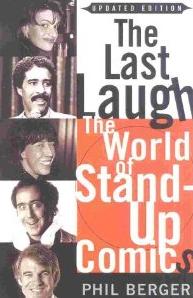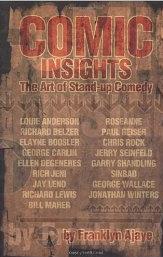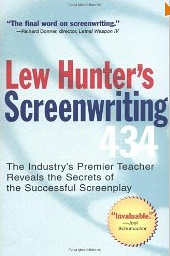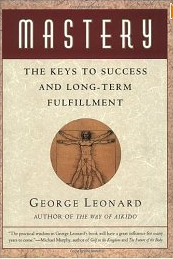I recently finished reading “Zen and the Art of Stand-Up Comedy” by Jay Sankey and I highly recommend it if you’ve been doing comedy consistently for at least a couple of years as this book is more advanced in lots of places. Below are the quotes I found most interesting, as always, if you like the quotes, please buy the full book.
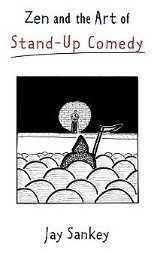 “Stand-up is a public act of sharing, between an individual and a group.” (xvii)
“Stand-up is a public act of sharing, between an individual and a group.” (xvii)
“Most comics are extremely sensitive, relatively insecure, very insightful, highly intelligent people. Strong individuals rather than group members, with a burning desire to share what they think and feel (at least while onstage). Theirs is the perspective of the Outsider, the observer, a perspective that undoubtedly has a truth to it, but also one that is often unusually myopic.” (5)
“Comics tend to feel strangely separated from society.” (5)
“Many of the most successful female comics seem to talk more about being human than being female.”(8)
“I often ask myself, “What do people care about?” – a question I believe to be one of the real keys to this craft.” (14)
“If you’re funny, there’s probably a decent idea behind most funny thoughts you will ever have. It’s just a matter of finding the right context and the right way of doing it.” (15)
“The difference between wit that gets belly laughs and wit that gets bored silence is not only a matter of the style the material is both written and delivered in, but also a matter of the degree to which the audience cares about the subject.” (18)
“The success of the material often comes down to four elements: surprise, credibility, truth and exaggeration.” (24)
“For a joke to be credible, it must be believable in two ways. It must be believable in relation to the character, and it must be believable in relation to the world… So when writing a joke, keep in mind that the audience must be able to believe that the joke suits your stage character and the world, at least as that character sees it.” (26)
“Realize that exaggeration often works best if it still somehow echoes the truth.” (28)
“Strong writing creates a single image for everyone in the crowd, each person imagining a very similar thing.” (36)
“If they don’t care, they’re not going to laugh.” (37)
“When you begin to list stuff to a crowd, it immediately undercuts the idea that you are spontaneously speaking “off the top of your head.” (39)
“Any limitations you perceive in your audience are more often an expression of your own limitations as a thinker and a communicator than anything else.” (43)
“The longer the set up, the stronger the punch line must be.” (45)
“You should keep in mind that the greater the amount of time elapsing between a callback and the information you’re calling back to, the greater the chance of people not remembering.” (45)
“The most successful comics tend to play characters that are two things: real and exaggerated.” (55)
“Successful stand-ups tend to concentrate on one or two of the pieces of their pie, and then exaggerate the degree to which these real characteristics dominate their personality. That way, they get to draw energy from real-life characteristics, but they also present a character who is inherently theatrical and powerful onstage.” (55)
“The two most important qualities you should strive to obtain are Likability and Vulnerability.” (57)
“There’s an old show biz expression, “If they like you, you can do no wrong. And if they don’t like you… good luck.” (57)
“Truly effective hooks, with staying power and credibility, tend to naturally grow out of a character and act developed over many years.” (62)
“Here’s the problem: The more unusual and atypical your approach to stand-up, the more memorable and distinctive you will be. But… the more distinctive you are, the more limited your appeal might well be, the less accessible your act is, and the more doors will be closed to you.” (62)
“You should think of the material you choose for your first few minutes as “defining.” (65)
“The degree to which other comics can use your material, and still have good success with it, is the degree to which your material is impersonal and unoriginal.” (66)
“The jokes a comic becomes famous for are jokes that only he or she can get away with.” (66)
“As a rule of thumb, I wear lighter-colored shirts at bar gigs and “one-nighters” because they tend to have poor lighting and I want to make sure my face and body really “pull the eyes” from across the room. I want to be very watchable. In club gigs I always try to wear a shirt that is a simple contrast to whatever wall is behind me. And if I don’t know the room beforehand, I’ll often bring two shirts so I have a choice.” (71)
“Deliver each line as if it’s your last (at least on that particular subject). Try to forget that you have several more tags to the punch line.” (80)
“One of the keys to surprising or shocking people in a way that results in laughter is to try to challenge people without making them feel threatened. This can be a real tightrope walk, because if you don’t run the risk of threatening them, of really challenging their prejudices, then you may well not create enough tension to generate big, loud laughs. Also, if your comedy isn’t really challenging people, presenting some fresh and sometimes shocking ideas to them, your material may be derivative, unoriginal pap.” (88)
“There is a very thin line indeed between seeming brave and confident and seeming brash and inconsiderate.” (90)
“Pronounced effort is any aspect of performance not only is often distracting but also can send a signal of insecurity and lack of control to the audience.” (98)
“[At the start] Try to give the impression that you are simply continuing something, something that goes on offstage as much as it does onstage.” (105)
“When first taking the stage and beginning to speak, you do not want to give the impressin of beginning a prewritten monologue. Strive instead to give the impression that yes, you have begun to share your thoughts and feelings with the audience, but the thoughts and feelings have been with you all day.” (105)
“The only thing that keeps the audience in their seats is wondering what’s going to happen next.” –David Mamet (108)
“The crowd looks to you to see how they should feel about what you are doing and saying, and if you look like you’re having fun, they’re going to be tempted to join in.” (112)
“Good comics have a relaxed air of strength about them.” (113)
“Most pros are strong; far fewer are actually aggressive. The difference is this: Strength suggests, while Aggression shows. Strength silently states, while Aggression shouts. And there’s something about shouting that betrays a need, even a fear. And fear is the enemy, especially when it comes to performing.” (114)
“Though it takes years to be a fine stand-up comic, it’s essential that you eventually come to believe that you are funny and have a right to be up on that stage, telling jokes in front of all those people. Offstage, a little self-doubt will take you far. But onstage, there’s no place for doubt.” (114)
“Experienced comics never seem to be “asking” a crowd for anything. Not approval, not laughter, nothing. They seem to just be speaking their minds, being who they are. Appearing relaxed and confident, the crowd in turns relaxes, confident that the comic not only is going to be funny, but is funny. Consequently, the audience is in the ideal state of mind to laugh and laugh freely.” (115)
“Great art is the concealing of art.” (117)
“There seems to be only one way to become excellent at something, and make it look so damn easy, and that’s by working so damn hard.” (117)
“There are millions of jokes out there waiting to be conceived, and stage time is too precious to waste on weak material.” (122)
“There’s no substitute for hard work, caring strongly about what you do, and a healthy dose of self-doubt.” (125)
“Always remind yourself, “Tonight doesn’t really matter. What matters is the performer I’m going to be five years form now.” I still tell myself that.” (126)
“It’s during transitions that the comic runs the greatest risk of losing focus, both the audience’s and his own.” (131)
“We all know how restrictive it can feel to have someone expect something from us, especially when we aren’t sure we want to give it to them.” (131)
“Coming onstage to the right sound can set a tone for your act before you’ve even opened your mouth.” (134)
“It’s often a good idea for your opening joke to have unusually broad appeal.” (141)
“Also, keep your first joke short.” (141)
“It’s a good idea to present material that expresses a variety of different rhythms and structures. If all your jokes are approximately the same length, with approximately the same number of tags, it can create an effective rhythm, but it also can grow tedious, especially in longer sets.” (142)
“It’s a very good idea to be able to cover a rich range of feelings in that character.” (143)
“Her second to last joke was a very graphic bit about oral sex, then she quickly closed her show with a safer, cuter joke… Several people comment on how clean her act was. She had done a very clever thing, not ending with a dirty joke, which would leave the crowd with a last impression of her as a blue comic, but putting it right near the end, to really goose the audience’s final response.” (144)
“[in long sets] plan for periods in your set where you push them and periods where you let them breathe a bit. Plan your peaks and valleys.” (147)
“When headlining, variety is more important than ever.” (147)
“The very characters that are so interesting and successful during short sets sometimes fail during longer sets.” (147)
“It’s one of the classic frustrations of the craft that, in attempting to develop a simple, unique, and memorable style, every comic runs the risk of being too easily categorized or becoming uninteresting after a short period of time.” (148)
“Whatever the situation or crowd, think twice before expending too much energy too soon. Remember, if you start slowly, you can always speed things up.” (153)
“With a small crowd a comic is usually more successful if he delivers his material in a more intimate, conversational fashion.” (153)
“Being the first comic to hit the stage, and in a sense, set a tone for the entire show, it’s absolutely essential that an MC’s character appeals to a very broad demographic.” (160)
“When you’re headlining at a comedy club you can take your time. But a really tough gig can be like a street fight between you and the crowd. Generally speaking, whoever swings first and connects, ins. Take your show to them. Your character, your jokes, your energy. All of it.” (167)
“When one finds oneself feeling weak, admitting to it can be very self-empowering.” (173)
“As soon as one cherishes the thought of winning the contest or displaying one’s skill in technique, one’s swordmanship is doomed.” – Takano Shigeyoshi (175)
“You will be doing both yourself and the crowd a big favor by accepting the following fact: Not everyone will always love you.” (175)
“Sometimes no matter how good you are or how hard you work, things don’t always come together when you want them to. That’s life, and one can either accept ir or one can vainly fight against it.” (176)
“During your entire career, no money will ever be better spent than the money you spend on your promotional package.” (178)
“Whether you are experimenting with your material, your character, or your promo, your first mandate is to always get the attention of your audience.” (179)
“Every single piece of your package should reflect a similar style or tone, ideally that of your character and comedic perspective. So when trying to choose a color of paper, a typeface, or anything else, keep your character’s key words in mind, and do your best to have your choices reflect a similar sensibility. For example, if you character is bookish and insightful, choose an academic-looking typeface. If your character is a bit crazier and off-the-wall, choose a more eccentric typeface. But beware the temptation to try to be funny in your package. More often than not, it comes across as strained and actually works against you.” (180)
“In show business, the biggest risk is not taking any risks.” (182)
“When putting together a set for a comedy festival, there are two classic approaches, very much depending on your objectives. If you want to get booked into other comedy clubs, you’ll probably want to choose a group of jokes that express a single, concentrated character and perspective. The goal, as always, will be to be memorable. However, if your goal is to impress television people, you might better go with a set that gives you a chance to show a variety of abilities, from tight writing to acting to pacing, etc.” (186)
“When delivering their material, many pros make a point of delivering their set-ups to the studio audience, and their punch lines to the camera.” (188)
“Comics with a lot of television experience often make sure they can end their set with any one of their last three jokes, just in case.” (189)
“Many artists jump into the waters of their art wearing a life preserver, and more often than not, it’s the life preserver that drowns them.” –Henry Miller (193)
“In some bar gigs, taking a beer onstage with you can make you “one of the crowd,” and that can be a good thing” (194)
“One minute I’m the best album of the year, the next I’m the worst thing that’s ever been created on earth. So if I want to go on that roller-coaster ride, then I’m an idiot.” –Alanis Morissette (194)
“Every show is not so much an end in itself, but a means to something much bigger and better. Namely, a funnier me. Perhaps without even realizing it, the crowd has paid to come watch me… learn.” (194)
“Where I am is important, but so is where I’m going.” (195)
“The longer one practices a craft, the harder one has to work to continue learning.” (195)
“Lulls in progress, both artistically and careerwise, can be frustrating, puzzling, even depressing. But remember, it’s at times like this that the hobbyists get out of the business, and the real, die-hard comics hang in. Do everything you can to try not to let it get to you.” (196)
“As you progress as a stand-up comic, the valleys between the mountains will grow wider and sometimes even deeper. But have faith. Keep giving of your heart and time to your craft, and with a little luck, another mountain will be yours.” (197)
“It’s not about being “too smart” or “too hip” for the room. Have you ever heard a mechanic say he wasn’t able to solve a problem with a car engine because he was “too clever?” (200)
“I force myself to own up to certain hard truths, particularly after a rough show, is by asking myself, “Can I think of a comic, any comic, who could’ve done more with that crowd?” And if the answer is “Yes” then I am, once again, left holding the responsibility bag.” (201)
“The “greats” of almost any discipline or profession tend to think of themselves as amateurs, as students, forever trying to learn more about there area of interest or so-called expertise.” (202)
“I now try to accept the situation for what it is, and put my energy toward making the most of the situation.” (207)
“As a performing artist, one of the things that one eventually has to leave behind is fear of failure.” (209)
If you liked the quotes, click here to buy the book.

